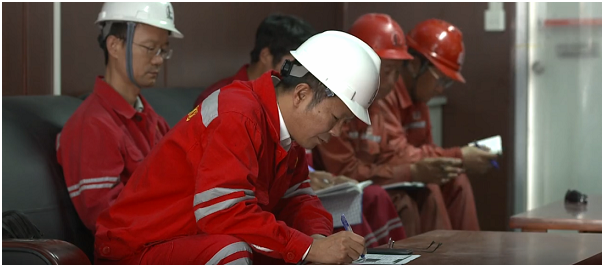Entering the Kuwaiti market in 2008, Zhang Congbang, manager of the Kuwait subsidiary of Sinopec International Petroleum Service Corp (SIPSC), said he was plagued by certain problems. How on earth could his company tap into the Kuwait market and what was the size of the market? He was consequently appointed to explore the market with his team.

Zhang Congbang (L) communicates with his colleague at a drilling site. [Photo/sasac.gov.cn]
The global financial crisis in 2008 led to sharp fall in global oil prices and stoppage of a large number of domestic petroleum engineering companies.
Therefore, though it was not the first time Zhang had explored overseas markets as he had worked in Sultan and Saudi Arabia, he faced unprecedented pressures and challenges, and had to take on the “mission impossible” amid the global financial crisis.
In order to save money, Zhang rented a house in a remote apartment building in Kuwait. Taking some bread, biscuits and water with them, Zhang and his team got busy communicating with local governmental departments, Kuwait Petroleum Corp(KPC), subcontracting companies and the construction sites.
Recalling their early days in Kuwait, he said they could have regular meals only at suppertime.
After analyzing the local laws and regulations, taxation policies, technical specifications and the strength of competitors, and especially the country’s long-term development strategy of the petroleum production, Zhang decided that there was a great opportunity for his company to take a local market share in petroleum engineering.
However, China is unfamiliar to most Kuwaiti people, not to mention Sinopec.
“When we arrived, the Kuwait side didn’t show much interest in us and worried whether Chinese companies could complete projects with the expected high level of quality,” Zhang said.
Zhang found it necessary to meet senior KPC executives. He once prepared for a long-time for a face-to-face meeting to introduce Sinopec’s technological index and data of domestic equipment. He invited the Kuwait side to inspect Chinese factories and learn the standard of “made in China”.
He also visited the construction sites of Sinopec’s competitors and learned the cost of equipment, oil and human resources.
In addition, Zhang and his team worked with domestic manufacturers to understand the technological aspects required, helping them establish an internationalized quality system.
“KPC agreed to use some Chinese rig equipment on a trial basis. Finally, the first-rate quality and reasonable price of domestic products won recognition from Kuwait,” Zhang said.
Based on careful investigation and calculation, Zhang’s team won a drilling rig sales contract worth $860 million in a hot bidding battle in April 2009.
The Kuwait subsidiary of SIPSC signed a big rig agreement worth $2.1 billion in 2014 when the international oil price slumped, becoming the biggest rig contractor in Kuwait.
Its new contracts reached $3.01 billion in the oil drilling sector in the first quarter, signaling landmark projects in China-Kuwait cooperation.At present, the company owns 53 drilling crews and employs more than 3,000 workers from China and elsewhere in Kuwait.

Zhang Congbang (L) works with his colleague. [Photo/sasac.gov.cn]
(Executive editor: Hao Wen)